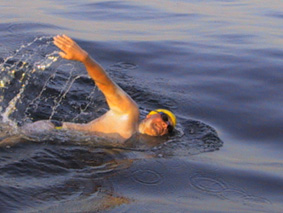The English Channel is the Everest of swimming... but for some people, it's worth doing several times
December 2003.
It is known as the Mount Everest of swimming: the 22-mile stretch of water between Dover, England, and the coast of France, presents the highest goal, the pinnacle of achievement for distance swimmers.
There are longer swimming routes, of course, but it is not merely the distance that gives the English Channel its reputation. Turbulence, powerful currents and low water temperatures conspire against the determined swimmer, along with all the traffic of the world's busiest shipping lane. Small wonder that, for years, many considered the Channel swim an impossible feat.
The person who proved them wrong was an Englishman, Matthew Webb, who crossed the Channel in 21 hours 45 minutes back in 1875, battling nausea from a jellyfish sting, and taking swigs of brandy from his support crew to resist the water temperature of 14 degrees Celsius (about 58 degrees Fahrenheit). Despite more than 70 attempts, this feat was not repeated for another 36 years!
Nowadays, swimming the Channel is slightly more common - English swimmer Alison Streeter has swum the Channel a record 43 times - but even so, only the toughest swimmers need apply.

Karteek Clarke, from Edinburgh, has run several marathons and a few ultra distance races. However, like several other students of Sri Chinmoy, he has also been inspired to take his endurance capacity to the water. He has now swum the Channel five times, one of only a handful of people to do so.
"On the one level," he says, "it's a great goal to have through the winter, to keep you focused on your training. On another level, it's just a great thrill to do an event like that. It links in very closely with meditation to me, going beyond your capacities. You find yourself doubting your capacities, but when you meditate on it, you find that you can tap in to the energy and capacity."
Karteek discusses his achievements with humility. To him, the "hero of the Channel" is not himself, nor any of his fellow swimmers, but his friend Devashishu Torpy, who has led the support crew for Karteek and others on several Channel swimming expeditions. (Despite the time it takes to swim the Channel, the UK-based Channel Swimming Association doesn't permit swimmers to hold on to the boat at any time, not even during rest breaks. However, for obvious safety reasons, swimmers must be accompanied by a vessel.)
Before the event itself, Karteek trains for several months. He swims three miles, a few times each week, usually in a pool. Three months before the event, he increases his training to longer swims, in open water. His spare time is spent raising (or earning) money for his swims, which cost a minimum of £2,000 each time (including £1,500 to hire a boat with a crew).

Astonishingly, Karteek never wears a wetsuit for his Channel-crossing, following CSA rules. While training, he has a high-fat diet, partly so that his body can withstand the cold waters. However, while undergoing this training, it can be very difficult to gain weight.
When Webb swam the Channel, over 120 years ago, the strong currents meant that the 22-mile distance became a 50-mile swim. Today's swimmers time their swims for better conditions, so Karteek's times have always been safely under Webb's 21-hour milestone. When he first swam the Channel in 1997, he did so in under 12 hours. Three years later, his second attempt was dogged by bad weather and force five winds, leaving him seasick. Nonetheless, he still made it to the end within 15 hours.
His third attempt, in 2001, was blessed with good weather, allowing him to finish in less than 13 hours. His personal best time, the following year, was an excellent 10 hours 53 minutes.
"It's a great metaphor for life," he says. "You have to fight against the tides, the bad weather and the feeling of seasickness to get to the Golden Shore. It then gives you a lot of strength in your day-to-day activities."
In 2003, he was plagued with seasickness again, to an even greater extent. However, he persevered, reaching the coast of France in 16 hours -- his slowest time so far, but still reaching his goal.
To some swimmers, this was possibly his most impressive swim. Speed is one mark of achievement, but enduring the remorseless waters of the English Channel, for so many hours, is a victory of another sort. When you have swum the Channel, how can you be anything less than a champion?
NOTE: Since this article was originally published, Karteek has swum the Channel yet again.
























